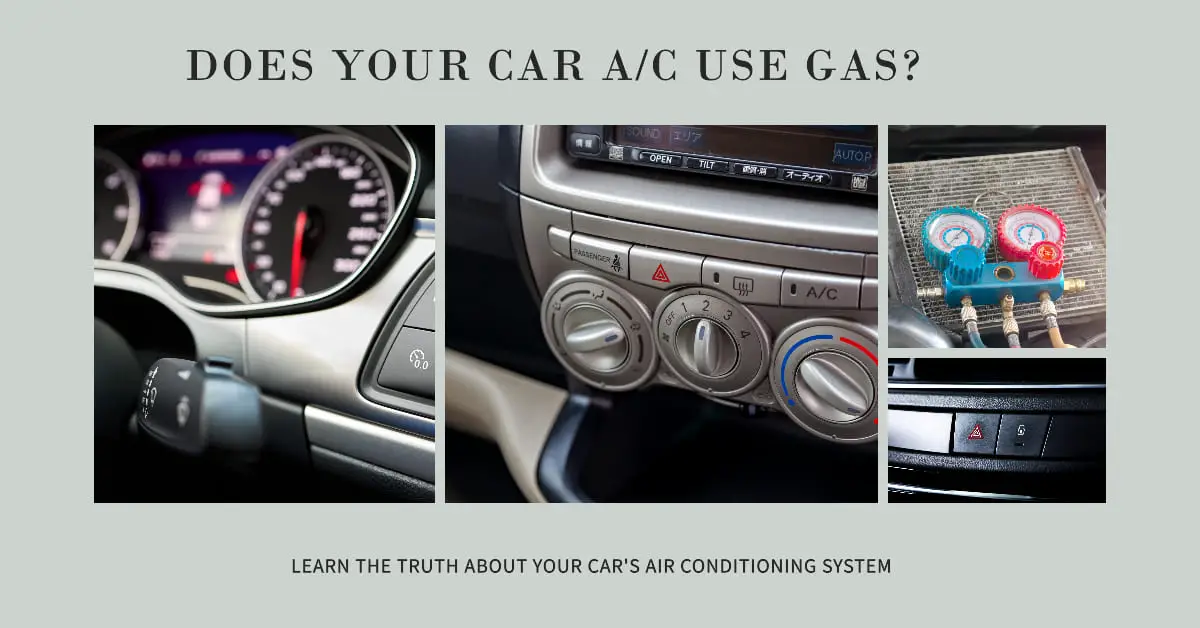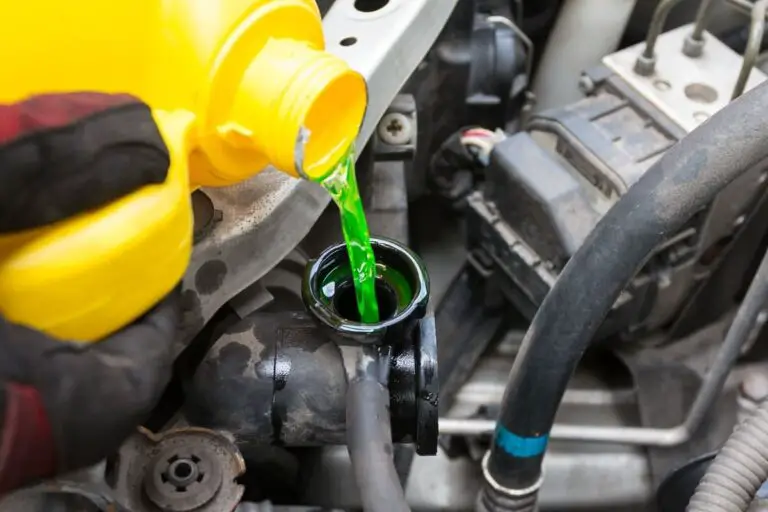Does A Car A/C Use Gas? Here’s What You Need To Know

A car’s air conditioning system is a vital component for many drivers, especially during hot summer months. However, there is a common question among car owners: does a car A/C use gas? The answer is yes, but the amount of gas used varies depending on the age of the car and the type of A/C system installed.
According to experts, modern car A/C systems have become more efficient and use less gas than older systems. However, the older the car, the more it will affect fuel economy. In general, car A/C systems will cause a negligible reduction in MPG, perhaps only 1% or 2% lower than usual. Nonetheless, it is essential to understand how car A/C systems work and how they impact gas mileage to make informed decisions when using them.
Table of Contents
How Does a Car A/C Work?
A car’s air conditioning system works by removing heat and moisture from the air inside the car, leaving it cool and dry. The system uses a refrigerant, which is a chemical that can absorb and release heat as it changes from a liquid to a gas and back again. The refrigerant is circulated through the system by a compressor, which is driven by a belt connected to the engine.
The refrigerant enters the compressor as a low-pressure gas, and the compressor compresses it into a high-pressure gas. This high-pressure gas then flows through a series of tubes and fins in the condenser, which is located in front of the radiator. As the high-pressure gas flows through the condenser, it releases heat to the surrounding air, causing it to condense into a high-pressure liquid.
The high-pressure liquid then flows through a small orifice called the expansion valve, which reduces its pressure and causes it to expand rapidly. This expansion causes the refrigerant to cool down significantly, and it becomes a low-pressure gas again. The cool, low-pressure gas then flows through the evaporator, which is located inside the car’s dashboard.
As the cool gas flows through the evaporator, it absorbs heat from the air inside the car, causing the air to cool down. The evaporator also removes moisture from the air, which is why the air that comes out of the A/C vents is usually dry. The cool, dry air is then blown back into the car’s cabin by the blower motor.
The process of removing heat and moisture from the air inside the car continues as long as the A/C system is running. The system is designed to maintain a constant temperature and humidity level inside the car, regardless of the outside conditions. However, the A/C system does require a certain amount of energy to operate, which is why it can affect the car’s fuel economy to some extent.
Does a Car A/C Use Gas?
When driving a car, it is common to use the air conditioning system to keep the interior cool and comfortable. However, many drivers wonder if using the A/C system will affect their car’s fuel efficiency. The answer is yes, using the car’s A/C system does use gas.
The A/C system in a car runs off the engine’s power, which means it puts an extra load on the engine. This extra load requires more fuel to keep the engine running, which results in lower fuel efficiency. The older the car, the more it will affect fuel economy. Older vehicles may use up to 10% or 20% more gas when their A/C is switched on.
However, in modern cars, the effect on fuel efficiency is negligible. The reduction in MPG is perhaps 1% or 2% lower than usual. It is still important to keep the car’s gas mileage in mind when using the A/C system, but it is not as significant as in older vehicles.
To improve fuel efficiency while using the A/C system, drivers can limit their use of the air conditioner in general. Using the A/C system only when driving at higher speeds can also help improve overall fuel efficiency. Additionally, regular maintenance of the car’s A/C system can help ensure it is working efficiently and not using more gas than necessary.
Factors That Affect A/C Fuel Efficiency
The fuel efficiency of a car’s air conditioning system is affected by various factors. Here are some of the most important ones:
- Age and size of the car: The older and larger the car, the more fuel it will consume when the A/C is turned on. This is because older cars have less efficient A/C systems, and larger cars require more energy to cool the interior.
- Outside temperature: The hotter it is outside, the harder the A/C system has to work to cool the interior of the car. This can lead to a decrease in fuel efficiency.
- Driving speed: The faster the car is driven, the more fuel it will consume, and the A/C system will have to work harder to maintain a cool temperature inside the car.
- Maintenance of the A/C system: Regular maintenance of the A/C system can help improve its efficiency and reduce fuel consumption. This includes cleaning or replacing the air filter, checking the refrigerant level, and inspecting the compressor and other components for wear and tear.
- Use of other electrical devices: Other electrical devices in the car, such as the radio or headlights, can also affect the fuel efficiency of the A/C system. This is because they draw power from the car’s battery, which in turn requires the engine to work harder and consume more fuel.
Tips to Improve A/C Fuel Efficiency
When it comes to improving A/C fuel efficiency, there are several things that drivers can do to reduce their fuel consumption and save money. Here are some tips to help you improve your car’s A/C fuel efficiency:
- Park in a shaded area: Parking in a shaded area can help keep the interior of your car cooler, which means that your A/C will have less work to do when you start driving. This can help reduce your fuel consumption and save you money in the long run.
- Use the recirculate feature: Using the recirculate feature on your A/C can help reduce the amount of outside air that your A/C has to cool, which can help improve your fuel efficiency. However, be sure to turn off the recirculate feature when you’re stuck in traffic or driving in heavy pollution to avoid breathing in harmful air.
- Keep your windows closed: Keeping your windows closed while driving can help reduce the amount of air resistance that your car has to overcome, which can help improve your fuel efficiency. However, if you’re driving at low speeds or in stop-and-go traffic, it may be more fuel-efficient to turn off your A/C and roll down your windows instead.
- Maintain your A/C system: Regular maintenance of your A/C system can help ensure that it’s running at peak efficiency, which can help improve your fuel efficiency. Be sure to have your A/C system checked and serviced regularly by a qualified mechanic.
- Use A/C sparingly: Finally, using your A/C sparingly can help reduce your fuel consumption and save you money. If you’re driving at low speeds or in mild weather conditions, it may be more fuel-efficient to turn off your A/C and open your windows instead.
Conclusion
In conclusion, a car’s air conditioning system uses gas to run, with some systems consuming more gas than others. However, the impact on fuel economy is relatively small, especially in modern cars. While turning off the AC may save a small amount of gas, the main factor affecting fuel economy is engine efficiency.
It is important to note that older vehicles on the road may experience a more significant reduction in fuel economy when the AC is turned on, up to 10-20% more gas consumption. Regular maintenance of the car’s AC system can also help improve its efficiency and reduce gas consumption.
To optimize fuel economy while still enjoying the comfort of air conditioning, drivers can take the following steps:
- Use the AC only when necessary and turn it off when it’s not needed.
- Park in the shade or use a sunshade to reduce the need for AC.
- Keep windows and doors closed while driving to reduce drag and improve aerodynamics.
- Maintain proper tire pressure and keep the car well-tuned to improve overall efficiency.
By following these simple tips, drivers can save gas and reduce their carbon footprint while still enjoying a comfortable ride.
FAQs
Does using the A/C affect fuel efficiency?
Yes, using the A/C in a car can affect fuel efficiency, but the impact is minimal in modern cars. Expect a negligible reduction of 1% to 2% in MPG. However, older cars may experience a drop of 10% to 20% in fuel efficiency when the A/C is turned on.
How much gas does the A/C use?
The A/C in a car uses gas, just like any other component in the vehicle. The engine powers the alternator that supplies energy to the A/C. When the A/C is turned on, it uses fuel to power the engine, which means that gas is used up. The amount of gas used by the A/C depends on various factors, such as the age of the car, the type of A/C system, and the outside temperature.
Can using the A/C damage the engine?
No, using the A/C in a car will not damage the engine. However, it can put extra strain on the engine, especially in older cars. This strain can lead to increased wear and tear on the engine, which may eventually lead to problems.
Is it better to drive with the windows down or the A/C on?
It depends on various factors, such as the outside temperature, the speed of the car, and the fuel efficiency of the vehicle. In general, driving with the windows down may be more fuel-efficient at lower speeds, while using the A/C may be more fuel-efficient at higher speeds. However, the difference in fuel efficiency is minimal, and it is ultimately up to personal preference.







